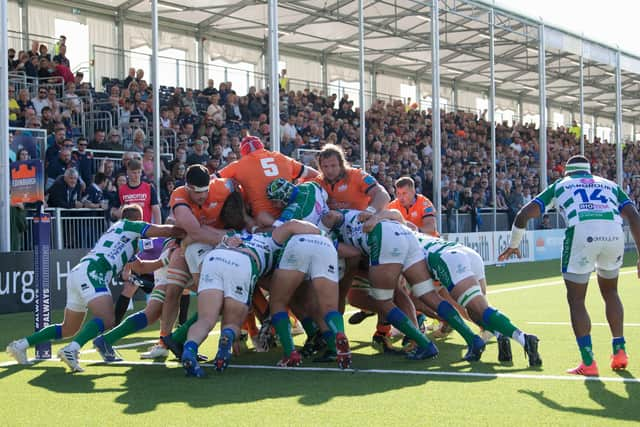High-scoring rugby matches does not guarantee excitement - especially with that pesky rolling maul
High-scoring everywhere – or almost everywhere. Attack is getting the better of defence. It’s on account of mastery of the off-loading game, so says Stuart Barnes writing in The Times, and drawing attention to Toulouse among others. Fair enough; they are a brilliant team. Then he adds that it is now almost as easy to score from a five-metre line-out as to defend when faced with the prospect of the rolling maul. This is probably true. Does it, I wonder, make for a more exciting game?
Not really. While admiring the skill with which Glasgow Warriors construct their rolling maul and score lots of tries from it, I can’t help thinking that it’s a boring way of scoring, even when it’s your own team doing so. There’s an illogicality about the maul; the only part of the game where you can’t tackle the ball-carrier and bring him down. Some 20 years ago there was indeed a change in the law to allow the ball carrier in a maul to be tackled and brought to ground. The experiment, deeply unpopular with English clubs, didn’t last long. So we’re no doubt stuck with it because nine out of ten penalties awarded to a team in the opposition half, even the 22, will be popped into touch. Maybe the five-metre line should be moved back to ten metres.
Advertisement
Hide AdAdvertisement
Hide AdSome nigh-scoring matches are of course enjoyable, but are often too one-sided to grip. Not always of course – we all remember with astonishment that 38-38 Calcutta Cup draw at Twickenham. Nevertheless high-scoring matches are often more one-sided than the final score suggests, a well-beaten team rally to make it more respectable by scoring a couple of very late “consolation” tries. In contrast some of the most encompassing matches are low-scoring. There were only two tries, one to each side, in our 1990 Grand Slam match against England


The European Cup matches this month have been notable for home dominance. There have been hardly any away wins. Glasgow came very close to beating Harlequins away – close enough to make one feel they would surely have won if they had had a home tie – and then Harlequins brought off a one-point victory away against Bordeaux, though there only a missed conversion cost the home team the match. Otherwise it’s been a case of home happiness, away blues. Leinster had a handsome win in Dublin against their recent rivals La Rochelle. Who would now bet against a Leinster-Toulouse final, since both will have home semis? The TV networks might protest, but there’s a lot to be said for the knock-out stages of a cup being drawn from the hat – even if it’s an electronic one now. The element of chance adds interest to cup-ties.
Meanwhile, with their European hopes gone, Glasgow and Edinburgh can concentrate without distraction on their position in the URC league and securing their place in the knock-out stages. Glasgoww should certainly do so, while Edinburgh have a fair chance, though they are unlikely to get a home draw in the knock-out stage. There is no doubt that the inclusion of the South African sides has made what we used to call the PRO14 a considerably tougher league, even if many of us still think it somewhat absurd to have southern hemisphere clubs in a northern competition. But they are here for keeps and it is interesting that they have found it almost as hard to win in the north and northern clubs to win in South Africa
Finn Russell’s unfortunate injury, the first really serious one (as I remember) of what is now quite a long career means that another season has gone by for him without club glory. Still, he has had his hands on the Calcutta Cup a few times now. There is only one Scot who has brought off the double of winning the Calcutta Cup and the European one which we used to know as the Heineken, and that is Andy Nico, who led Scotland to Calcutta Cup victory and Bath (Finn’s club now of course) to Heineken triumph. I guess, might even bet, that it’s likely to be some time before any Scot brings off such a double.
Comments
Want to join the conversation? Please or to comment on this article.